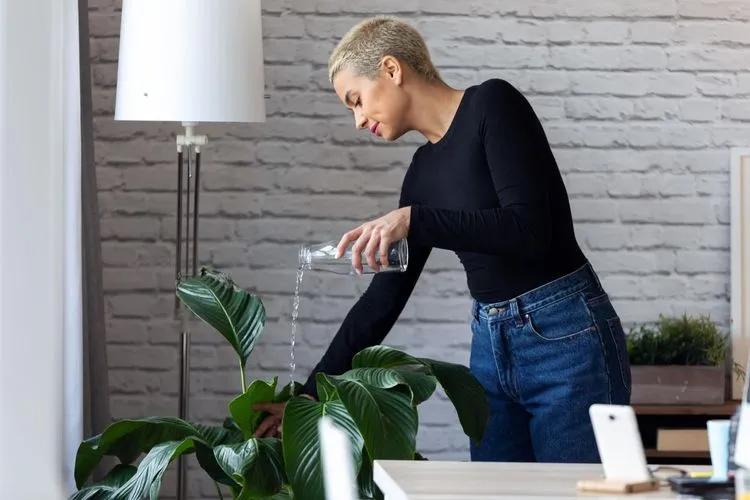Irrigation water is essential for the development and growth of indoor plants. All nutrients necessary for this in the soil are available to plants only when dissolved in water. The quality of the water affects how these substances are dissolved and then absorbed by the roots.
In addition, the water itself contains mineral salts dissolved in it, which play an essential role in the life of plants.

Pay Attention to the Species
Sooner or later, beginner growers face the question: what water is best to water the plants? It all depends on the specific plant. Some plants require mildly acidified water, such as orchids, azaleas, Carmona, hydrangeas, or ferns.
Other plants require hard water with a high lime content. A striking representative of this group of plants is oleander.
Nevertheless, most indoor plants are acidophiles. They do not like too hard water, in which there is a lot of lime, and therefore, with prolonged watering with tap water, their leaves begin to turn yellow, chlorosis develops, and a white bloom appears on the surface soil.
So what is the best water to care for your indoor plants?
Springwater or Rainwater
Springwater is the best option for most plants. It's clean and doesn't contain any chemicals that the water from your tap has, but at the same time, it is enriched with minerals. However, springwater might be challenging to get, so that it might be substituted with rainwater.
Rainwater is also much purer than tap water. The only downside is that you'll need to let the rainwater warm up if it's not room temperature yet. But if you live in a city, using rainwater is problematic. It may contain elements that green friends will not like at all. Thus, rainwater should not be collected immediately but a few minutes after the start of rain.
Distilled Water
Distilled water is a type of purified water achieved by boiling water away and then condensing the vapor. Distilled water is completely devoid of all micronutrients, which in small amounts are vital to plants. On the other hand, this kind of water provides an impurity-free source of irrigation that can help prevent toxicity.
Distilled water is also a suitable choice for most plants. It is the best option after spring and rainwater. However, it is still better to pay attention to your plant species: while some of them, like carnivorous plants, must be watered with distilled water, others might not tolerate it since it is free from any minerals.
Tap Water
The vast majority of flower growers use tap water. The issue with it is that such water is hard. Watering plants with hard water can cause a white crust to form on the surface of the soil. It does not pose any harm in itself, but many plants require exceptionally soft water. These are, for example, azalea, gardenia, camellia, orchids, and hydrangea.
Also, tap water contains several harmful chemicals, including lead, chlorine, and pathogens. They are detrimental to your houseplants and might cause problems. However, there are some methods of reducing the harm of tap water and making it purer.

How to Improve the Quality of Tap Water for Plants
Even if tap water is your easiest option, it can contain chlorine, salts, or minerals that stress plants. Luckily, there are simple ways to make it safer:
Let It Set
The first rule that every plant enthusiast should know is that you need to settle the tap water for irrigation for at least a day. It is necessary so that all the chlorine evaporates from it. After that, the water becomes much more suitable for your plants.
Boiled Water
Chlorine can also be removed by boiling. To quickly remove chlorine, add 0.5 teaspoons of baking soda per liter of water to the water. Boil the solution and let it cool. Immediately after that, your plants can be watered.
Meltwater
Melted water is devoid of excess salts, but its preparation will take some time. Pour the water into a container and put it in the freezer. Watch when some of the water freezes, and some will still be in a liquid state. The unfrozen water should be drained off - it will contain the greatest amount of dissolved salts. Allow the frozen water to thaw and warm up to room temperature before watering.
Filtration Systems
The most popular in this regard are reverse osmosis systems; they purify water from almost all impurities by filtering through a semi-permeable membrane. Such small-scale units can often be seen in kitchens as a source of clean drinking water. This water will be perfectly safe to use and can be obtained in any amount limited only by the capacity of the particular filtration system.
Alternatively, the jug filter cartridges containing special ion-exchange resins and carbon particles, which purify water from salts and chlorine, can be used.
Using spring- or rainwater is the best option to care for your green friends. Distilled water is also a great choice, but not all the species would like it though. However, even if you want to use ordinary tap water, there are many ways to make it healthier for your plants.

FAQ
How Does Hard vs Soft Tap Water Affect Houseplants?
Hard water contains minerals like calcium and magnesium that can leave white crusts and cause yellowing on acid-loving plants. Soft water is gentler and safer for most houseplants, especially ferns, orchids, and hydrangeas. Match water type to your plant’s preference to avoid stress and nutrient issues.
Is Rainwater or Distilled Water Better for Sensitive Plants?
Rainwater is naturally soft and mineral-rich, making it ideal for most plants. Distilled water is completely pure, perfect for highly sensitive species like carnivorous plants, but it lacks nutrients.
Should I Let Tap Water Sit Before Watering to Reduce Chlorine?
Yes! Let tap water sit for 24-48 hours to let chlorine evaporate. If your water has chloramine, this won’t work. In this case, use a filter or other treated water. Check your local water supply to keep your plants healthy.
